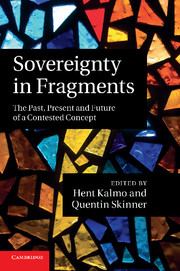Book contents
- Frontmatter
- Contents
- Notes on contributors
- Acknowledgements
- Introduction: a concept in fragments
- 1 The sovereign state: a genealogy
- 2 The apparition of sovereignty
- 3 The Westphalian myth and the idea of external sovereignty
- 4 Double binds: sovereignty and the just war tradition
- 5 The durability of organized hypocrisy
- 6 A matter of fact? The many faces of sovereignty
- 7 The survival of sovereignty
- 8 Sovereignty and after
- 9 Prolegomena to the post-sovereign Rechtsstaat
- 10 Sovereignty beyond the state
- 11 Sovereignty between government, exception and governance
- 12 Conclusion: vocabularies of sovereignty – powers of a paradox
- Bibliography
- Index
Introduction: a concept in fragments
Published online by Cambridge University Press: 04 February 2011
- Frontmatter
- Contents
- Notes on contributors
- Acknowledgements
- Introduction: a concept in fragments
- 1 The sovereign state: a genealogy
- 2 The apparition of sovereignty
- 3 The Westphalian myth and the idea of external sovereignty
- 4 Double binds: sovereignty and the just war tradition
- 5 The durability of organized hypocrisy
- 6 A matter of fact? The many faces of sovereignty
- 7 The survival of sovereignty
- 8 Sovereignty and after
- 9 Prolegomena to the post-sovereign Rechtsstaat
- 10 Sovereignty beyond the state
- 11 Sovereignty between government, exception and governance
- 12 Conclusion: vocabularies of sovereignty – powers of a paradox
- Bibliography
- Index
Summary
The status of sovereignty as a highly ambiguous concept is well established. Pointing out, or deploring, the ambiguity of the idea has itself become a recurring motif in the literature on sovereignty. As the legal theorist and international lawyer Alf Ross put it, ‘there is hardly any domain in which the obscurity and confusion are as great as here’. The concept of sovereignty is often seen as a downright obstacle to fruitful conceptual analysis, carried over from its proper setting in history to ‘plague and befog contemporary thought’. It seems to bring with it so many hidden meanings and connotations of absolutist forms of government that a more moderate age, committed to international law and increasingly enmeshed in the web of global interdependence, simply has no use for it. So contested is the concept that, rather than pursuing the contestation, many political theorists think we should give up so protean a notion. Granting that the debate on the relevance of sovereignty frustratingly oscillates between claims that it will either continue to exist or that it is about to disappear, forgetting it altogether, and thereby escaping this seemingly endless argument, can easily appear as the most urgent task for political theory. ‘In order to think in a consistent manner in political philosophy’, wrote Jacques Maritain between the two World Wars, ‘we have to discard the concept of sovereignty’.
- Type
- Chapter
- Information
- Sovereignty in FragmentsThe Past, Present and Future of a Contested Concept, pp. 1 - 25Publisher: Cambridge University PressPrint publication year: 2010
- 8
- Cited by



